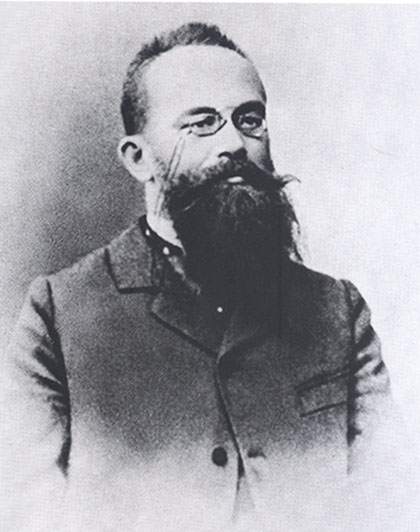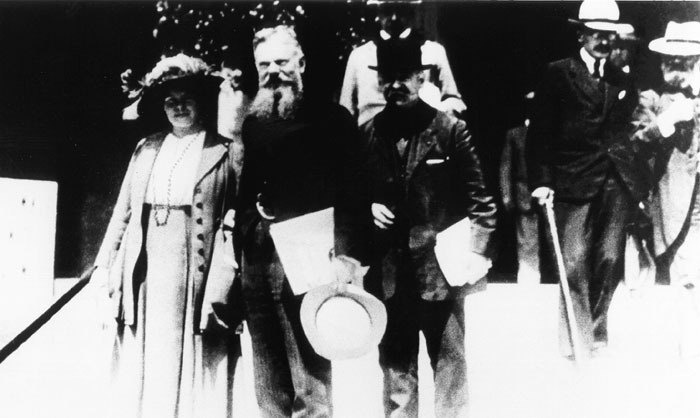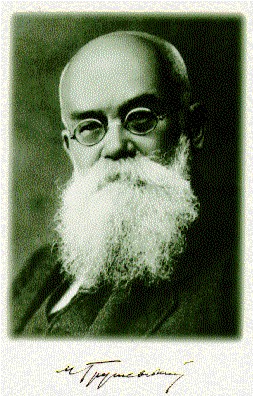Who was Mykhailo Hrushevsky
Mykhailo Hrushevsky

Hrushevsky, Mykhailo [Hruševs′kyj, Myxaijlo], b. 29 September 1866 in Kholm, d. 25 November 1934 in Kislovodsk, North Caucasus krai, RSFSR. The most distinguished Ukrainian historian; principal organizer of Ukrainian scholorship, prominent civic and political leader, publicist, and writer; member of the Shevchenko Scientific Society (NTSh) from 1894, the All-Ukrainian Academy of Sciences (VUAN) from 1923, and the USSR Academy of Sciences from 1929. Hrushevsky's father, Serhii, was a Slavist and pedagogue. In 1869 the family moved to the Caucasus where Hrushevsky graduated from the classical gymnasium in Tbilisi (1886). While still a gymnasium student he began to write belles lettres in Ukrainian; his first publication was a story that appeared in the newspaper Dilo in 1885. Hrushevsky graduated in 1890 from the Historical-Philological Faculty at Kyiv University, where he was a student of Volodymyr Antonovych. His first scholarly publications were "Iuzhnorusskie gospodarskie zamki v polovine XVI v." (Feudal Castles of South Rus′ in the Mid-16th Century), in Kievskie universitetskie izvestiia, 1890; "Volynskii vopros 1077-1102" (The Volhynian Question, 1077-1102), in Kievskaia starina, no. 33 (1891); and "Hromads′kyi rukh na Ukraïni-Rusi v XIII vitsi" (The Social Movement in Ukraine-Rus′ in the 13th Century), in Zapysky NTSh, 2 (1892). He remained at Kyiv University to prepare his candidate's thesis, published as Ocherk istorii kievskoi zemli ot smerti Iaroslava do kontsa XIV veka (A Survey of the History of the Kyiv Land from the Death of Yaroslav to the End of the 14th Century, 1891), and then received a master's degree for the dissertation Barskoe starostvo: Istoricheskie ocherki (The Bar County: Historical Survey), published in 1894. That year, on the recommendation of V. Antonovych, Hrushevsky was appointed professor of the newly created chair of Ukrainian history (officially it was called The Second Chair of Universal History, with special reference to the History of Eastern Europe) at Lviv University.
Upon arriving in Lviv, Hrushevsky became active in the NTSh. He became the director of the Historical-Philosophical Section in 1894, and in 1897 he was elected president. With extraordinary energy he reorganized the NTSh, which under his leadership became akin to an academy of sciences. He collected funds, founded a library and museum, initiated scholarly contacts with a host of academic bodies, and gathered around him many scholars, including his close collaborator for many years, Ivan Franko. Under Hrushevsky's editorship (1895-1913) the major journal of the NTSh, Zapysky NTSh, was transformed from an annual to a quarterly and then a bimonthly publication. In 1895 he established the Archeographic Commission of the NTSh, which published documents and sources for Ukrainian history in its serials Zherela do istoriï Ukraïny-Rusy and Pam'iatky ukraïns′ko-rus′koï movy i literatury. Much of Hrushevsky's own work was published in these journals and later republished in Rozvidky i materiialy do istoriï Ukraïny-Rusy (Research and Materials toward a History of Ukraine-Rus′, 5 vols, 1896-1905). In Lviv Hrushevsky developed a school of Ukrainian history with historians such as S. Tomashivsky, O. Terletsky, M. Korduba, I. Krypiakevych, V. Herasymchuk, I. Dzhydzhora, I. Krevetsky, D. Korenets, and O. Tselevych.
In 1898, together with I. Franko and V. Hnatiuk, he founded Literaturno-naukovyi visnyk, the most important forum for Ukrainian literature and political disussion of its time. Hrushevsky was also one of the organizers of the Ukrainian Publishing Association (1899) and the Society of Friends of Ukrainian Scholarship, Literature, and Art (1904). Hrushevsky's contribution to the development of Ukrainian education in Galicia deserves particular attention. From 1908 he headed the Teachers' Hromada and from 1910 the Provincial School Union. Soon after arriving in Lviv he began to work towards the creation of a Ukrainian university there, beginning with the organization of a popular lecture series and summer school.
In 1898 the first volume of his monumental Istoriia Ukraïny-Rusy (History of Ukraine-Rus′) was published in Lviv; by 1937 nine more volumes, covering Ukrainian history to 1659, had appeared in Lviv and Kyiv. This work was the first major synthesis of Ukrainian history ever written. In 1904 his Ocherk istorii ukrainskogo naroda (Survey of the History of the Ukrainian People) was published in St Petersberg (2nd ed. 1906; 3rd ed. 1911). A general overview of Ukrainian history, this work was based on the course he had taught at the Russian Higher School of Social Studies in Paris in the spring of 1903. It was republished with some changes in a more popular form as Iliustrovana istoriia Ukraïny (Illustrated History of Ukraine; the first of several Ukrainian editions appeared in 1911, and a Russian version was published in 1912). Subsequently, versions of these popular histories appeared in German, French, English, Bulgarian, and Czech.
In 1904, in a collection of the Russian Imperial Academy of Sciences titled Sbornik statei po slavianovedeniiu, vol. 1, Hrushevsky published perhaps his most important essay, titled "Zvychaina skhema 'rus′koï' istoriï i sprava ratsional′noho ukladu istoriï skhidn'oho slov'ianstva" (The Traditional Scheme of "Rus′" History and the Problem of a Rational Ordering of the History of the Eastern Slavs). In this article Hrushevsky traced the history of Ukraine and of the Ukrainian people to the period of Kyivan Rus′ and argued that the history of the Ukrainian nation is distinct from that of the Russian both in its origin and in its political, economic, and cultural development (the German translation of the article appeared in 1935, and the English in 1952). Although the argument was rejected by most Russian historians, who believed that the modern Russian state was the only direct descendant of Kyivan Rus′ and rejected the idea that the Ukrainian nation had developed as a result of a separate and unique history, Hrushevsky's scheme and periodization of Ukrainian history was accepted, with some changes, by most Ukrainian historians, including those in Soviet Ukraine (until 1929) and in the emigration, as the basic scheme of Ukrainian national historiography.
As a student and during his first years in Lviv, Hrushevsky devoted most of his energy to organizing Ukrainian scholarly and cultural life. In Kyiv he worked closely with V. Antonovych, O. Konysky, and other activists of the older generation associated with the Hromada of Kyiv. In Galicia he began to play a more active role in Ukrainian political life. In 1899 he was one of the founders of the National Democratic party, although he quit the party soon afterwards. Hrushevsky's real political activity, however, began only after the 1905 Revolution in Russia, which resulted in the easing of restrictions on Ukrainian life and political parties. From then on Hrushevsky spent most of his time in Russian-ruled Ukraine, although he remained a professor of Lviv University until 1913.

Hrushevsky (centre) leads the Ukrainian Delegation at an international conference held on August 2, 1919, in Lucerne, Switzerland.
Hrushevsky was a prolific publicist. In 1906 in St Petersburg he helped found and was a regular contributor to Ukrainskii vestnik, the official organ of the Ukrainian club of the State Duma. His articles on Ukrainian and international political affairs appeared in various other Ukrainian and Russan publications (especially Literaturno-naukovyi visnyk and Ukrainskaia zhizn') and in several separate collections, including Z bizhuchoï khvyli (From the Current Wave, 1906), Osvobozhdenie Rossii i ukrainskii vopros (The Liberation of Russia and the Ukrainian Question, 1907), Nasha polityka (Our Politics, 1911), in which he sharply criticized the leaders of the National Democratic party in Galicia, and Vil′na Ukraïna (Free Ukraine, 1917).
After a brief stay in St Petersburg, Hrushevsky transferred his activities to Kyiv, where in 1907 he began to publish the Literaturno-naukovyi visnyk. In 1907 he also cofounded the Ukrainian Scientific Society, modeled on the NTSh, serving as its first head and coeditor of its journals Zapysky Ukraïns′koho naukovoho tovarystva v Kyievi and Ukraïna (from 1914). In order to foster Ukrainian national consciousness among the peasantry, Hrushevsky founded and published the popular newspaper Selo (1909-11); when this was closed down by the Russian government, he established Zasiv (1911-12). In 1908 Hrushevsky was one of the founding members of the Society of Ukrainian Progressives, emerging as the universally acknowledged leader of the Ukrainian movement.
During the First World War, the Russian government again clamped down on Ukrainian activities, and Hrushevsky was arrested in the fall of 1914. After a two-month imprisonment in Kyiv, he was exiled to Simbirsk, then to Kazan, and finally to Moscow, where he remained under police surveillance. Despite this repression he continued his scholarly work and even helped edit Ukrainskaia zhizn' and the Ukrainian-language weekly Promin'.
Hrushevsky was released from exile after the February Revolution of 1917, and he quickly emerged as the leader of the Ukrainian national revolution. On 17 March, while still in Moscow, he was elected chairman of the Central Rada. Under his direction, this body soon became the revolutionary parliament of Ukraine. In 1917 Hrushevsky became a supporter of the newly formed Ukrainian Party of Socialist Revolutionaries (UPSR), the majority party in the governing Central Rada. On 29 April 1918, he was elected president of the Ukrainian National Republic (UNR).
A coup d'etat led by P. Skoropadsky overthrew the government of the UNR. This ended Hrushevsky's involvement in government, although he continued his political activities, especially in the UPSR, and his publicistic work-for instance, in 1918 he published the collection Na porozi novoï Ukraïny: Hadky i mriï (On the Threshold of a New Ukraine: Thoughts and Dreams). In 1919 he emigrated and increased his political-publicistic activities as a member of the Foreign Delegation of the UPSR. For the next few years he traveled widely in Western Europe, trying to rally support for the Ukrainian independence movement and re-establishing scholarly contacts. In 1919 he founded the Ukrainian Sociological Institute in Vienna (later moved to Prague), which published, among other works, his Pochatky hromadianstva (henetychna sotsiolohiia) (The Beginnings of Society [Genetic Sociology], 1921), Z pochatkiv ukraïns′koho sotsiialistychnoho rukhu: Mykhailo Drahomanov i zhenevs′kyi sotsiialistychnyi hurtok (On the Beginnings of the Ukrainian Socialist Movement: Mykhailo Drahomanov and the Geneva Socialist Group, 1922), and Z istoriï relihiinoï dumky na Ukraïni (On the History of Religious Thought in Ukraine, 1925). His political writings of this period show his increasing reconciliation with Communist rule in Ukraine and his desire to return to Ukraine to continue his scholarly and civic work; he was especially encouraged by the announcement of Ukrainization and the New Economic Policy.
In 1923 Hrushevsky was elected a full member of the VUAN, and he left for Kyiv in early 1924, an action for which he was severely criticized by most Ukrainian political emigres of the time. At the VUAN Hrushevsky soon resumed his role as the central figure in Ukrainian scholarship. He assumed leadership of the VUAN archeographic commission, organized a series of academic commissions to research Ukrainian history and folklore, and directed the training of young historians as the holder of the Chair of Modern Ukrainian History. He revived and edited Ukraïna (1924-30), which became the main organ of Ukrainian studies. He was also the editor of Naukovyi zbirnyk Istorychnoï seksiï VUAN (1924-29) and the collections Za sto lit (6 vols, 1927-30), Studiï z istoriï Ukraïny (3 vols, 1926-30), and Ukraïns′kyi arkhiv (3 vols, 1929-31). In Kyiv, Hrushevsky continued work on his major syntheses of Ukrainian history and literature. In 1926 Ukraine solemnly celebrated Hrushevsky's 60th birthday and the 40th anniversary of his scholarly work. That same year, collaboration was renewed between the NTSh and VUAN.
Despite Hrushevsky's great achievements in this period, opposition to him grew steadily in official circles and among Marxist scholars. Increasingly, his historical scheme was rejected as "nationalistic," and he was criticized for not adopting the official Soviet Marxist interpretation of Ukrainian history. In 1929 these attacks increased, and Hrushevsky was progressively forced to withdraw from his work in the VUAN. In March 1931 he was exiled to Moscow. Subsequently the institutions that he had founded at the VUAN were closed, the serials that he edited ceased publication, and most of his students and co-workers were arrested and deported. By 1934, the school of history he had founded in Soviet Ukraine was destroyed. Still, Hrushevsky remained a productive scholar in his last years, working mostly on Ukrainian historiography of the 17th and 18th centuries; his last two articles were published in periodicals of the USSR Academy of sciences in 1932 and 1934. Eventually, the difficult conditions of life in semi-freedom abroad and the further persecutions by the Soviet regime led to a deterioration of Hrushevsky's health. He died in Kislovodsk, where he had gone for medical treatment, and was buried in Kyiv in the Baikove cemetery.
Hrushevsky's historical approach was formed under the influence of his professor, V. Antonovych, as well as M. Kostomarov, M. Drahomanov, and later E. Durkheim. He belonged to the populist school of Ukrainian historiography and stressed the primacy of social or popular interests over the interests of the state and the nation. Later in his career, perhaps as a result of his own political activities, Hrushevsky began to attach more importance to the state and the political development of the Ukrainian nation. He rejected the Normanist theory of Ukrainian history, and considered the Antes the predecessors of the Ukrainian nation. Using a wide variety of sources, Hrushevsky outlined the ethnogenesis of the Ukrainian nation and established the continuity of Ukrainian historical processes, even through periods of Ukrainian statelessness. His historical scheme was adopted by some non-Ukrainian historians (e.g., A. Presniakov, M. Liubavsky, O. Halecki).
Hrushevsky also did considerable work in the history of literature. At first this entailed short digressions in Istoriia Ukraïny-Rusy; later he turned his full attention to this topic in the important Istoriia ukraïns′koï literatury (History of Ukrainian Literature, 5 vols, 1922-27; vol. 6 was published in the mid-1990s), which examined Ukrainian literature up to the beginning of the 17th century in relation to the development of culture. He also wrote numerous articles of literary criticism and reviews. In his Istoriia Ukraïny-Rusy, as well as in Kul′turno-natsional′nyi rukh na Ukraïni v XVI-XVII vitsi (The Cultural-National Movement in Ukraine in the 16th-17th Centuries, 1912; 2nd ed. 1920) and a series of his lesser works, Hrushevsky examined the development of education, religious life, art, printing, and other facets of Ukrainian culture. A number of his works were devoted to ethnography, folklore, and sociology. Hrushevsky also worked in archeology, publishing a series of articles and attempting the first synthesis of the archeology of Ukraine in vols. 1-3 of Istoriia Ukraïny-Rusy.
As a belletrist, Hrushevsky wrote tales, dramas, and short stories, many of which appeared in the collection Pid zoriamy: Opovidannia, nacherky, zamitky, istorychni obrazy (Under the Stars: Stories, Sketches, Notes, Historical Portraits, 1928). In total, Hrushevsky wrote over 1,800 works. His bibliography to 1904, compiled by I. Levytsky, is given in Naukovyi zbirnyk prysviachenyi profesorovy Mykhailovy Hrushevs′komy uchenykamy i prykhyl′nykamy (A Scholarly Collection Dedicated to Professor Mykhailo Hrushevsky by his Students and Friends, Lviv 1906), and a bibliography of his works from 1905 to 1928 is given in Iuvileinyi zbirnyk na poshanu akademika Mykhailo Serhiievycha Hrushevs′koho (A Jubilee Collection in Honor of the Academician Mykhailo Serhiievych Hrushevsky, Kyiv 1929).
Hrushevsky's accomplishments, as a scholar who realized the principal task of Ukrainian historiography (the synthesis of the entire Ukrainian historical process), as the organizer of Ukrainian national scholarship, and as a civic and political activist and one of the most prominent figures of the period of the liberation struggle, provoked the Bolsheviks to take a sharply negative attitude towards him, despite his return to Soviet Ukraine. The 1946 resolution of the central committee of the CP(B)U, in particular, and later Soviet publications characterized him as a "nationalist historian," "the ideologist of the Ukrainian counter-revolutionary bourgeoisie," and "the untamed enemy of Soviet rule."
In 1966 Ukrainian scholarly institutions in the diaspora commemorated the centenary of Hrushevsky's birth and in 1984, the 50th anniversary of his death. On these occasions, special issues of Ukraïns′kyi istoryk devoted to Hrushevsky were published. In 1974 the Ukrainian Historical Society began a separate serial publication, Hrushevskiana, devoted to the study of Hrushevsky's life and work. Hrushevsky wrote two short autobiographies: the first was published in Lviv in 1906 (repr. Toronto 1965) and the second in Kyiv in 1926 (2nd ed., with notes and introduction by L. Wynar, New York 1981).
